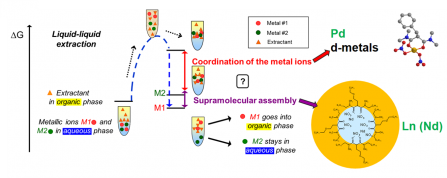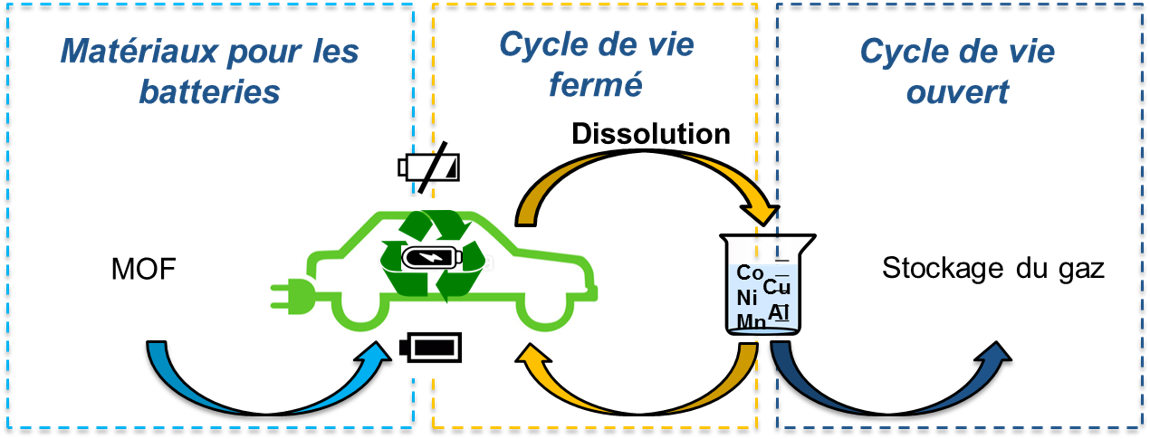
At the fundamental level, the focus is on adaptive separation problems, aiming at a controlled piloting of processes able to treat an incoming flow of variable composition. Following the use of fluorine compounds, Our understanding of the relative importance of strong and weak interactions in the extraction and separation of metals has allowed us to propose an original approach based on the spontaneous demixing of organic phases. The development of adaptive systems has been considered in parallel by an approach based on the implementation of dynamic covalent libraries: contrary to the classical method where a single molecule is designed to extract metal cations under specific conditions, dynamic covalent chemistry allows to induce the generation of extracting species depending on the composition of the medium. In collaboration with the LCS (ISIS), the LHyS team has applied this approach to the extraction of copper (II) nitrate by an organic phase based on a dynamic library of acylhydrazone-like constituents that self-construct and distribute within the biphasic system. The addition of copper(II) cations to this library triggers a modification of its composition and the regulation of ligand molecules driven by the link of cations métalliques.

The molecular systems studied are then used for the development of short circuits, in the various fields of the life cycle of metals treated at the ICSM: At the level of the nuclear fuel cycle, the studies carried out aim at the simplification of a closed cycle driven by safety, thanks to a controlled management of actinide mixtures. Separation is controlled by a judicious choice of the molecular topology of the extractants used, mainly malonamides, which allows to play on the following aspects kinetic and thermodynamic of separation. The approach also integrates the material finite aspect through the direct and controlled preparation of actinide materials, pure or in mixture, organized at the nanoscale. As nanoscale organized hybrid materials can display unusual properties compared to conventional inorganic materials, the team has developed two bottom-up approaches to target the precipitation of such materials. Finally, in a more general way, in order to answer the lack of possibilities of shaping porous materials with a wide applicability, we have developed, in collaboration with a team of CEA Marcoule (LPSD), an approach of preparation of hierarchically porous materials based on the stabilization of Pickering emulsions by means of MOF. Other means of shaping MOF-based materials are under study in the laboratory, like the 3D printing or the development of thin layer on conductive support.

In the waste and recycling industry, the approach developed aims at improving the value chain through the direct preparation, without purification, of high value-added compounds, taking into account economic and ecological models. Various applications are addressed, thanks to an established network of academic and industrial collaborations: - Development of precursor materials for energy storage:
Energy storage and its circular economy represent a major societal challenge for the years to come. In this field, the LHyS team is very interested in the recycling of Li-ion batteries and more particularly to that of the active electrode by an integrated approach based on various hydrometallurgical processes. This cycle includes the fabrication, dissolution and separation of species in a closed cycle mainly based on the use of hybrid materials type MOF (Metal-Organic Frameworks, thesis M. Cognet and T. Riant). All these actions include fundamental and applied studies and involve several national and international external groups (SCARCE project, E. Lagae-Capelle contract).

- Recovery and valorization of precious metals (Pd, Au) contained in electronic or industrial waste:
Based on the fundamental studies already published, the team developed different hydrometallurgical approaches for Pd recovery. In collaboration with different groups, it was then possible to propose a short recycling route of Pd by its directly valorize as catalysts. This work is continuing within the framework of the CAREME project financed by the ANR.
